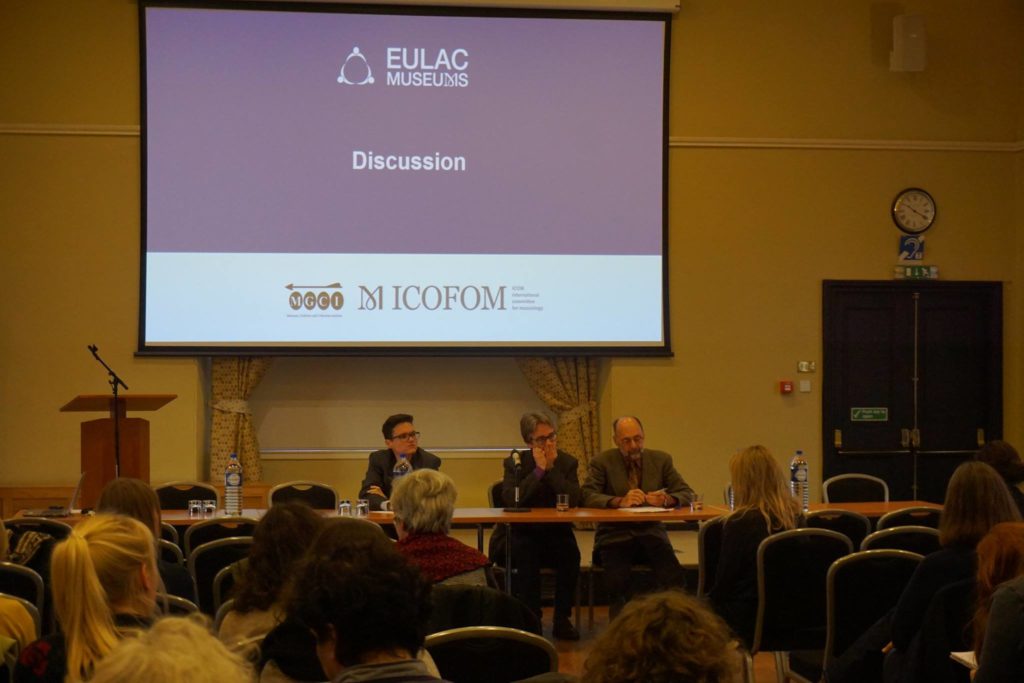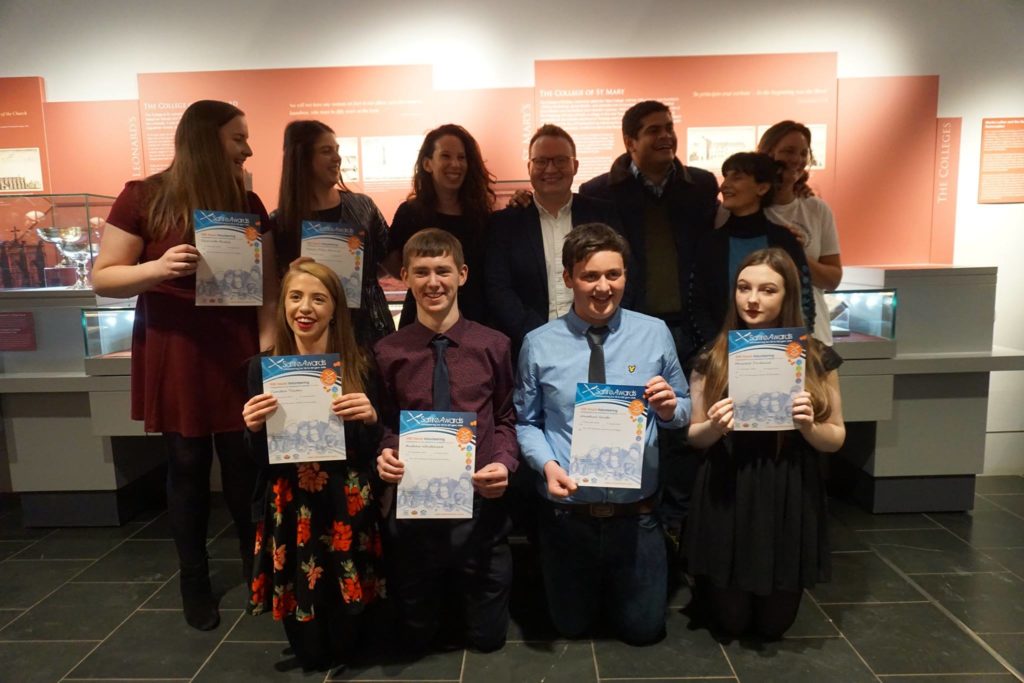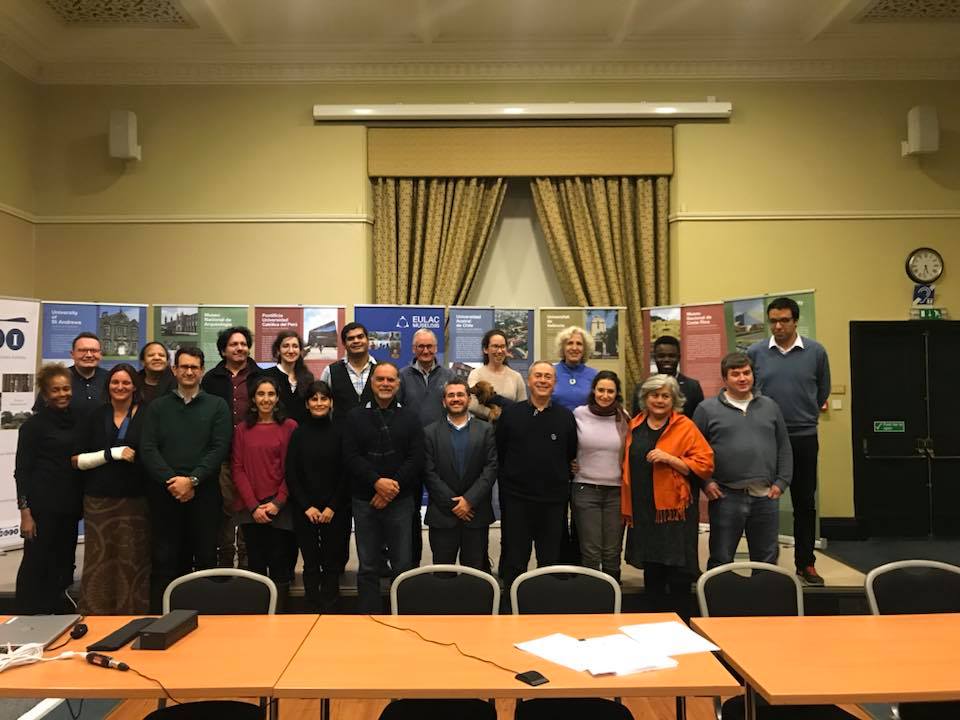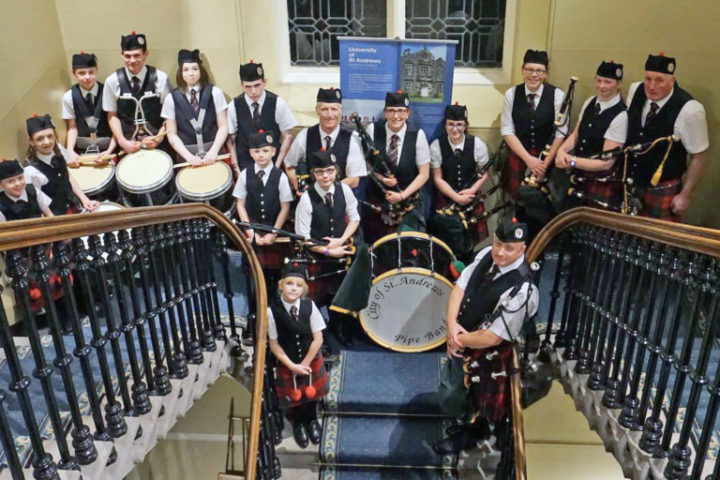Launched in October 2016, the EU-LAC-MUSEUMS research project on “Museums and Community: Concepts, Experiences, and Sustainability in Europe, Latin America and the Caribbean” is being developed by seven museums and research institutions in partnership with ICOM, thanks to the financial support of the European Union’s Horizon 2020 Research and innovation programme. From 24 to 29 November 2017, the Museums, Galleries and Collections Institute (MGCI) at the University of St Andrews played host to the 2nd EU-LAC-MUSEUMS general assembly with an array of meetings, workshops and activities across the university’s historic campus.
Symposia on the politics of display, museums and Caribbean identity
The series of events opened on Friday 24 November with a symposium on “The Politics of Display: Collateral Pavilions at the Venice Biennale Symposium” and the Annual Lecture of the the Museums, Galleries and Collections Institute of St Andrews University. Through this lecture, Alissandra Cummins, Director of the Barbados Museum and Historical Society and former ICOM President, addressed the theme “Plantation to Nation: Museums and Caribbean Identity”.

Fifth session of “Defining the Museum of the 21st Century”
On the next day was held the International Symposium “Defining the Museum of the 21st Century” under the auspices of ICOFOM. This one-day conference consisted of a number of papers, a round table discussion and an interactive session conducted by Lauren Bonilla-Merchav (President ICOM Costa Rica, Member of the ICOM Standing Committee on the Museum Definition; Steering Committee Member, EU-LAC-MUSEUMS project). Speakers came from the UK, Spain, France, Italy, Iran, Israel, Brazil, Chile, Costa Rica and the papers discussed museums in many parts of the world. The conference was opened by Professor Sally Mapstone (Principal and Vice-Chancellor of the University of St Andrews) and keynote speeches were delivered by Francois Mairesse (President of ICOFOM), Bruno Soares (Vice-President of ICOFOM) and Alberto Garlandini (Vice-President of ICOM and President of ICOM Italy).
Because this conference formed part of a suite of events strengthening EU–LAC museum relations, there was particularly strong participation of both Europe and Latin America – based speakers. The juxtaposition highlighted differences and tensions between what the speakers considered museums to be, and who they were for. On one side, a hegemonic Definition of a museum perpetuates the exportation of a European concept to the wider world. On the other, having the Definition embedded in laws helps international and national administrations (while making it harder to incorporate other ideas). Two of the papers focused specifically on “Community Museums” (in Mexico, and Africa) – a particularly pertinent theme for the EU-LAC-MUSEUMS project.
After a first session in June 2017 in Paris, France, a second one in October 2017 in Beijing, China, one in Buenos Aires, Argentina, and on in Rio de Janeiro, Brazil earlier in November, the St Andrews conference was the fifth of a series initiated by ICOFOM. This multi-lingual discussion will continue in a suite of symposia in other countries in the next months. While a tri-lingual publication in English, Spanish and Portuguese is being planned, the symposia papers are published on ICOFOM’s website.

The conference was followed by a Youth Award ceremony marking the partnership between MGCI, University of St Andrews and Skye Eco-museum in the EU-LAC-MUSEUMS Youth Exchange. A voluntary contribution by the City of St Andrews pipe band, and a Ceilidh dance ended the day’s proceedings.
Workshop on 3D technology for museums
On Sunday 26 November the 3D team of St Andrews University held a 3D Workshop and Round Table discussion in collaboration with the Museum of the University of St Andrews (MUSA). The exchanges explored how digital technology can offer local and global solutions through international project online platforms.
The four research and innovation areas of the EU-LAC-MUSEUMS project
The rest of the event was dedicated to the EU-LAC-MUSEUMS project’s general assembly itself, where the consortium partners and the project advisors (including representatives from ICOM LAC, ICOM Europe, ICOM Chile and ICOM Costa Rica) actively discussed the implementation of the project, shared ideas and strengthened their collaboration. EU-LAC-MUSEUMS comprises different Work Packages (WP) managed by the eight project partners: the University of St Andrews (Scotland), the University of Valencia (Spain), the National Museum of Archaeology (Portugal), the University of the West Indies (Jamaica, Barbados, Trinidad and Tobago), the Austral University of Chile, the Pontifical Catholic University of Peru, the National Museum of Costa Rica and ICOM. In addition to WPs dedicated to management, communication and dissemination, the partners are working on many activities around the theme of museums and communities, from different perspectives. During the general assembly, all partners presented the work they have been carried out since the project launch in October 2016.
EU-LAC-MUSEUMS project work falls into the following four areas of EU-CELAC enquiry:
- Technology and Innovation for Bi-Regional Integration.
- Museums for Social Inclusion and Cohesion.
- Fostering Sustainable Local and Regional Museums.
- Exhibiting Migration and Gender.

Technology and Innovation for Bi-Regional Integration
Technology in the project is primarily used as an enabling tool. Rather than investing large resources in speculative breakthroughs in new software, the ambition is to work with already tried and tested digital technologies, and apply them in novel ways. Through primary collaboration between the National Museum of Archaeology in Lisbon, Computer Science of the University of St Andrews, and the University of the West Indies, innovations will inevitably be made, but these innovations will lie primarily in overcoming the societal challenge of empowering remote communities to engage with their histories and heritage. Using new technologies, we aim to bring our professional and academic expertise together to build bridges between Europe, Latin America and the Caribbean. The three main technological means through which we will achieve this goal are the multi-lingual project Web Portal, developing community museum apps, and researching and co-curating Virtual Museums.
Over the first six months of the project, the 3D team from the University of St Andrews was on a tour to deliver collaborative 3D workshops in Europe and LAC, aiming at empowering partners with the necessary technological bases and tools. They also developed a virtual platform and mapto promote digitized cultural heritage of community museums. In parallel, the Portuguese team set up two databases accessible on EU-LAC-MUSEUMS’ website: one database lists community museums in participating countries while the second one records intangible heritage. ICOM members from Europe and LAC regions who are interested in contributing to enrich these databases are warmly invited to contact the website managers.
Museums for Social Inclusion and Cohesion
In this section of our project, partners aim to research state-of-the-art initiatives in museums and community empowerment, and then move beyond these initiatives to implement and evaluate our own innovative bi-regional community education projects. Our aim is to both transform individual lives within museum communities, and to create a method of implementation and evaluation that will be applicable to wider regions. Herein we focus on museum education, involving academic research into community museology, an intergenerational bi-regional museum education programme, and implementing a bi-regional youth exchange programme. It seeks to answer the following key questions in community museology:
How can we define “community museums” and “sustainability” in bi-regional context? What are the most important changes our small-scale museum communities are experiencing in EU and LAC? What are the most cutting edge initiatives of museums to promote social inclusion and cohesion in each region? How can small-scale regional museums gain agency in promoting best practice amongst museums and policy makers on a global stage?
To this end, EU-LAC-MUSEUMS is facilitating an exciting and empowering bi-regional youth exchange between Latin America and Europe, involving 24 young people (12 from Costa Rica, 6 from Portugal and 6 from Scotland). These 24 young people take part in monthly workshops discussing their rural community, identity, heritage, culture whilst building their self-confidence. They are encouraged to visit their local community museums as well as document their journey through an online blog. In summer 2017, the Scottish and Portuguese young people travelled to Costa Rica. This offered them an opportunity to immerse in another community and compare their respective heritage, which they reported to be an “experience of a lifetime”. In return, in summer 2018 the Costa Rican young people will visit the participating European communities.
Fostering Sustainable Local and Regional Museums
Museums are currently confronted with considerable political, economic and social changes. As an international professional organization of more than 37,000 members in more than 140 countries, ICOM considers the promotion and protection of the diversity and role of museums in society at the core of its mandate. The growing number of community and sustainable museums has been the subject of many discussions, publications and conferences among the professional network of ICOM National and International Committees over the past ten years. The EU-LAC-MUSEUMS project seeks to promote ICOM’s goals in ths regard across WPs, and especially through bi-regional research in Spain, Chile and Peru.
The University of Valencia has already been able to study historic irrigation cultural heritage in the region of Valencia. This is the first step of a larger study which will address territorial heritage resources as factors of economic development, and the identification of processes that allow the definition of a sustainable management of museums. EU-LAC-MUSEUMS also includes two case studies in Chile and Peru. On the one hand, the team of the Austral University of Chile has started an applied research investigation of a group of museums that are part of the Network of Museums and Cultural Centres of the Los Ríos Region. This investigation is evaluating each entity’s configuration and process and studying variables associated with the future sustainability of community museums. On the other hand, Peru has unfortunately suffered from floods which particularly affected the museums participating in the study. The exceptional floods, earthquakes and hurricanes that have affected the LAC region over the last months have raised acute concern for cultural heritage and natural disaster questions, in relation to social sustainability.
Exhibiting Migration and Gender
Within our EU-LAC project, the theme of Migration and Gender is the primary research focus of the University of the West Indies, who are collaborating with all partners and especially the University of St Andrews in the context of a fine art exhibition. We examine “past and present cultural, scientific, intellectual and social exchanges between individuals, countries and regions within the wide EU-CELAC area” by taking relations between the Caribbean and European as starting point, and make this research relevant to Central and Latin America through our new Virtual Museum (developed with with the 3D team), a programme of itinerant pop-up exhibitions, and an exhibition of contemporary art.
While all these activities will be further developed until 2020, the next major milestone will be the organisation of an international conference hosted in Barbados in November 2018.
–
The EU-LAC-MUSEUMS project has received funding from the European Union’s Horizon 2020 Research and innovation programme under grant agreement No 693669.
